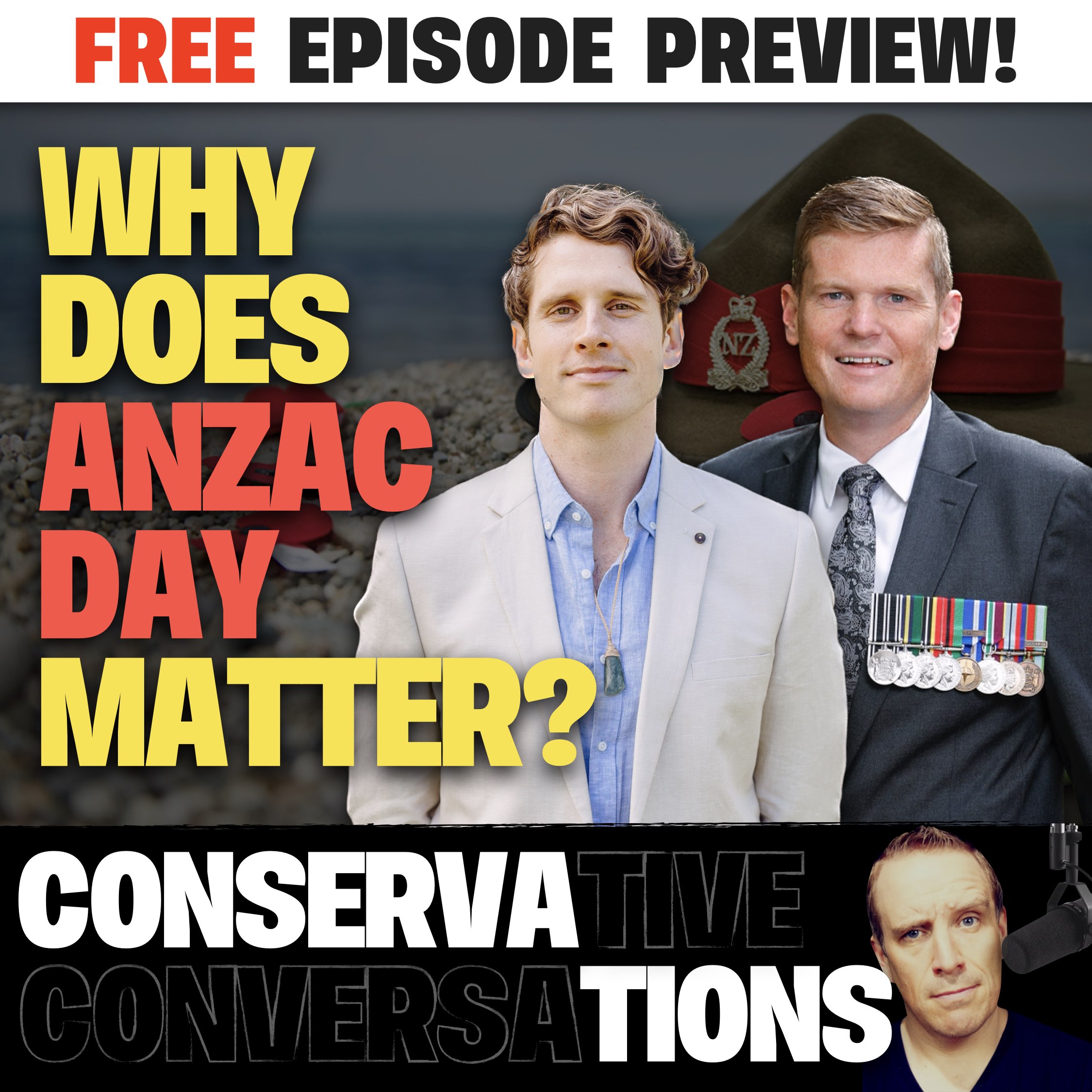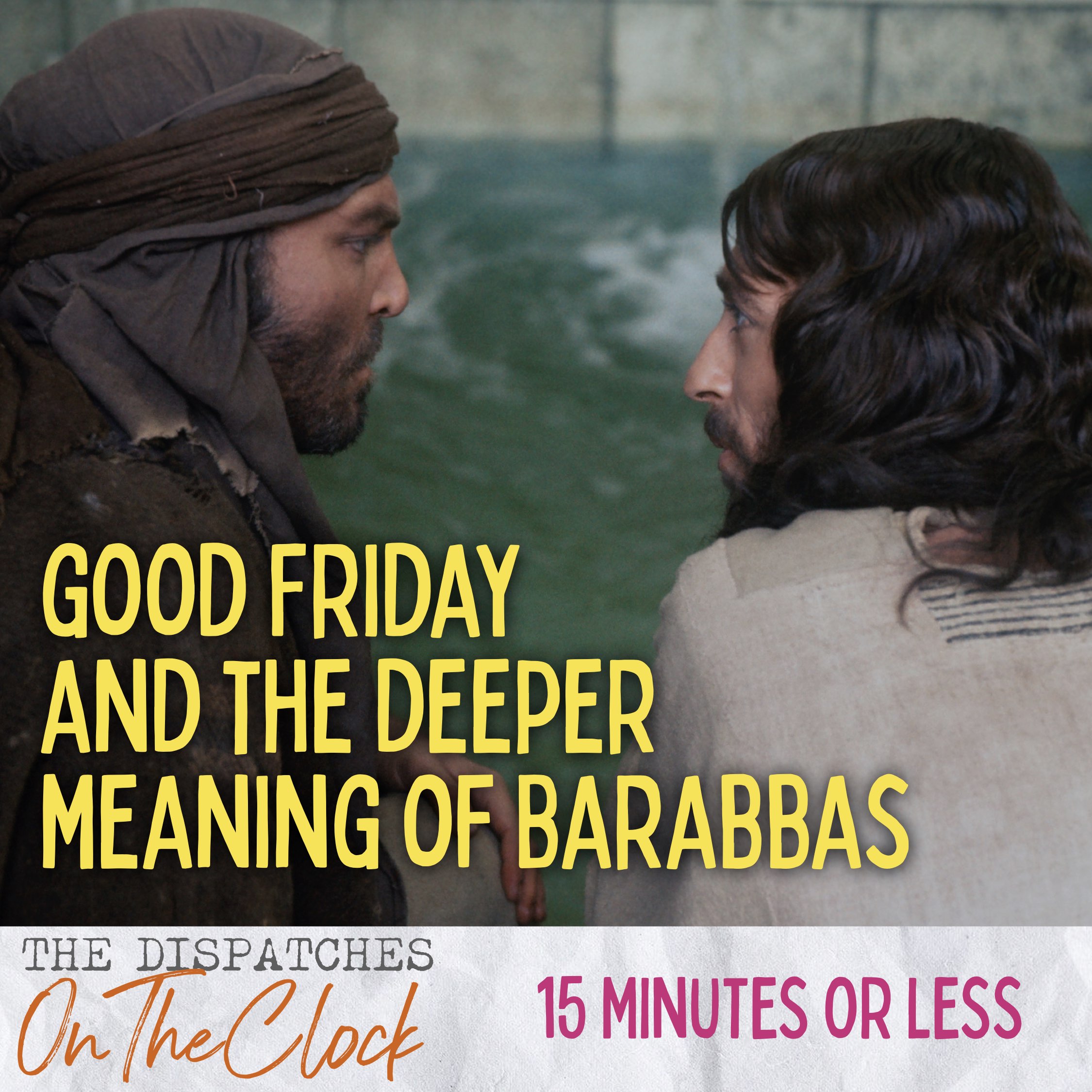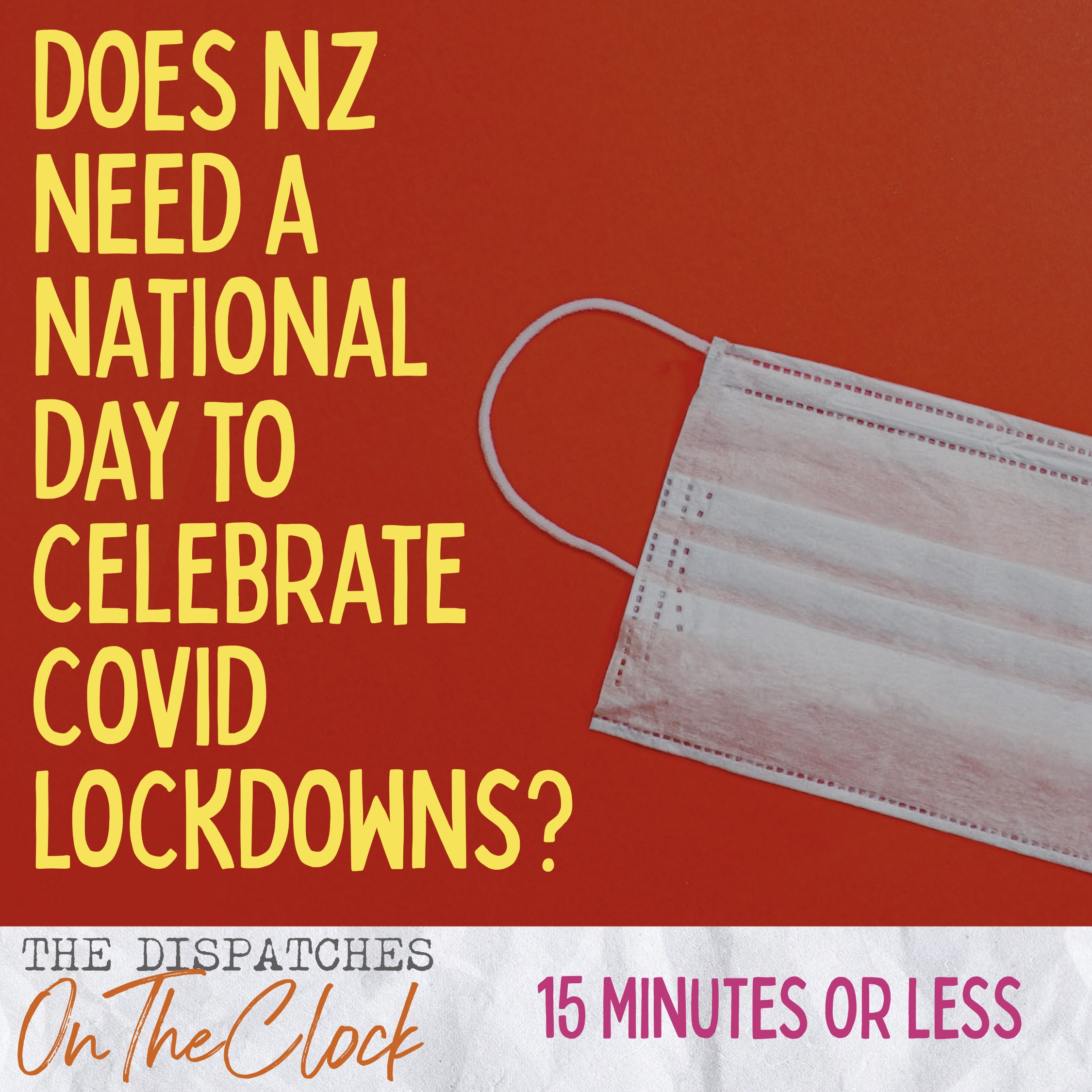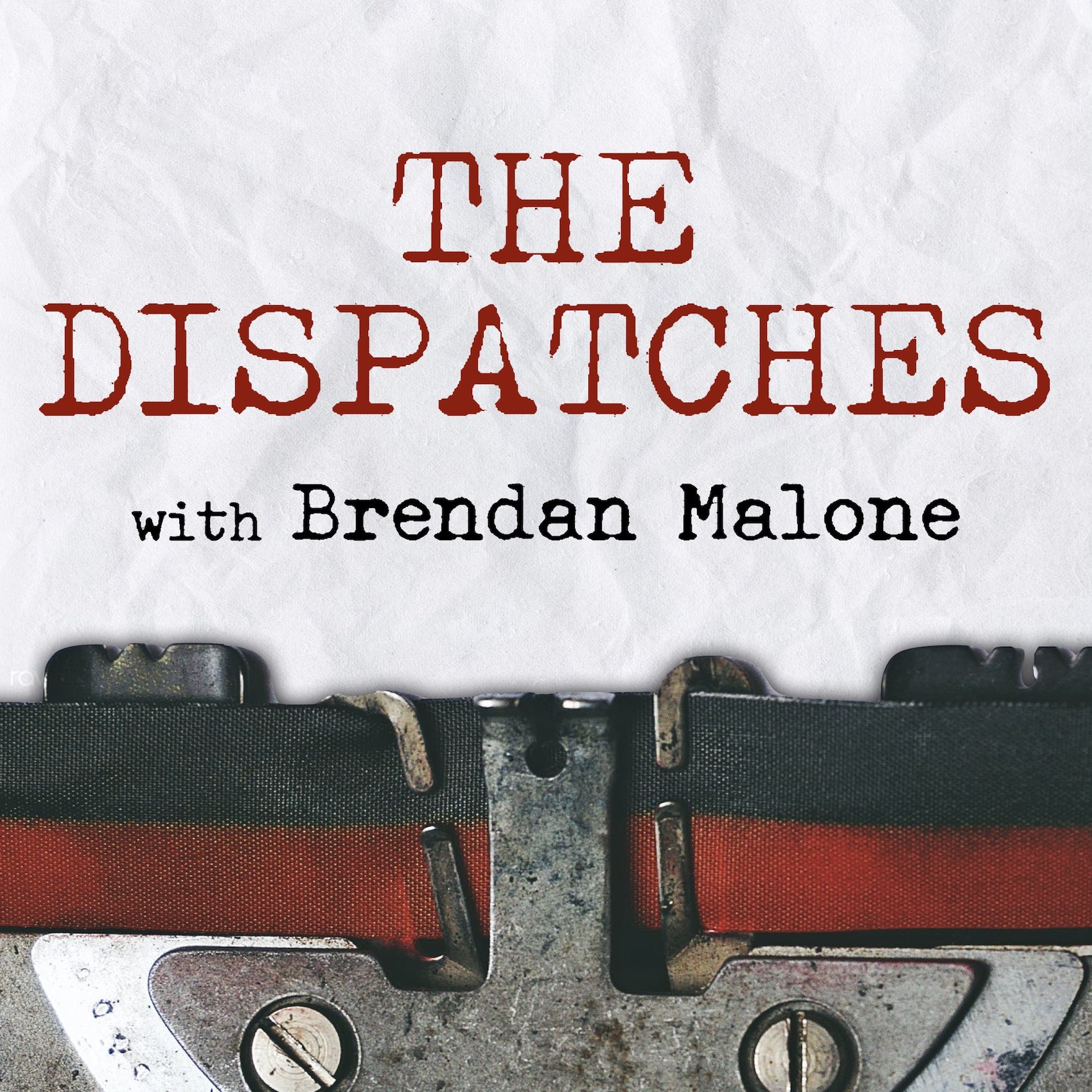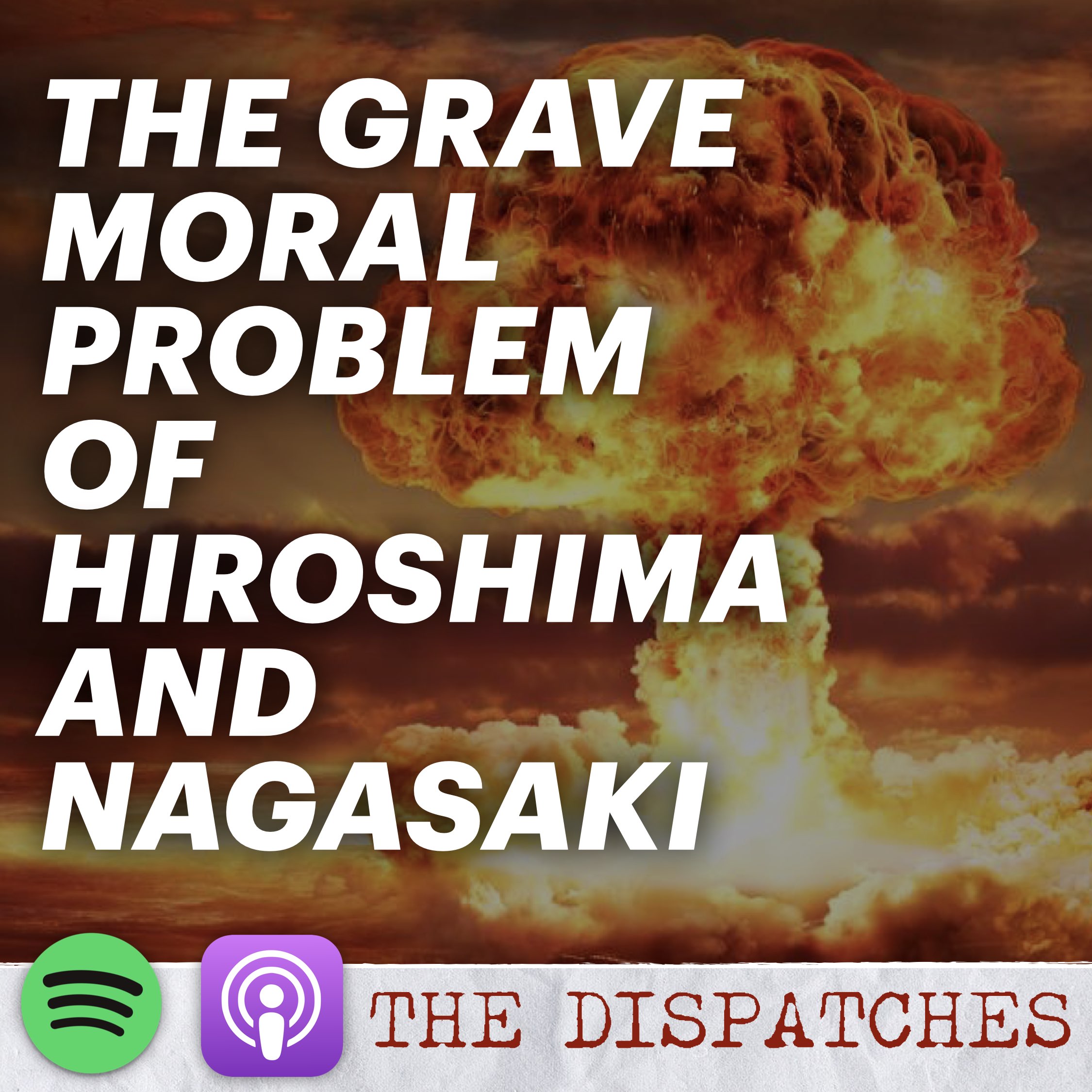[00:00:00] Speaker A: Ladies and gentlemen, start your stopwatches because you're listening to The Dispatchers on the clock. And in this episode, you'll get to hear a special preview snippet from our brand new podcast show, Conservations. Conservations is a monthly interview show where we bring on guests to have an indepth discussion about a specific topic or to hear their personal story. You're about to hear a preview snippet from this month's show, but if you want to listen to the full 85 minutes episode, all you have to do is become a patron with $5 or more per
[email protected].
Left Footmedia if you do that, not only will you get exclusive access to every single monthly episode of this brand new conservations interview show, but you'll also get exclusive access to our full length current affairs commentary podcast, The Dispatchers, every Monday and Wednesday. That's right, two exclusive, patrons only commentary podcasts every single week. But wait, because there's more. You'll also get exclusive access to the audio only podcast version of our brand new monthly video show called Movies That Matter, which takes an in depth look at a different film each month and the major cultural, philosophical and religious themes that it contains. Now, anyone can watch the YouTube version of that show, but only our patrons get exclusive access to the audio only podcast version each month as well. And just in case that wasn't enough, as a patron, you'll also get early access to all of our written articles. That's usually five to seven days before we make them freely available to the public on our website. All of this awesome content for just $5 per
[email protected] left Footmedia that's right. The cost of a cup of coffee gets you more than 12 hours of new and exclusive left foot media content every single month. So what are you waiting for? Sign up
[email protected]. Left Footmedia the link is in today's show notes. In the meantime, please enjoy this preview snippet from our brand new monthly interview show, Conservations.
Welcome to Conservations, the podcast, which got its name by literally combining the words conservative and conversations, which is exactly what happens on this show every month. Each episode, we host a conversation with at least one other guest where we go in depth on a topic or hear about their experiences on this journey we all share together called Life. The aim of this show is to foster and promote dialogue which cultivates goodness, truth and beauty, and in doing so, unpacks the richness of the authentic conservative tradition. My hope is that you'll find these conservative conversations intellectually, engaging and enriching, and that they will draw you ever more deeply into an authentic, truly flourishing and more meaningfully lived human experience.
In this month's episode we are going to be talking with academic and author Dr. Rowan Light and Royal New Zealand Air Force officer and pilot Tim Costley about the Anzac tradition which began with the Australian and New Zealand soldiers who fought during World War I in the Gallipoli campaign that took place on the Gallipoli Peninsula in Turkey from February 1915 to January 1916. Dr Rowan Light is an historian and lecturer at the University of Auckland, as well as being a Project Curator at the Auckland Museum. In 2022, Otago University Press published his book anzac nations the Legacy of Gallipoli in New Zealand and Australia, 1965 to 2015. The book explores the myth making around Anzac and how commemoration has evolved from 1965, when many assumed that the tradition of remembering the Anzacs would not survive beyond the death of the last Gallipoli veteran, to the Anzac Centenary in 2015, when the Australian Federal Government outspent all other countries and New Zealand's Centenary program was the largest commemoration in the nation's history. Tim Costly served over 22 years in the Royal New Zealand Air Force as a helicopter pilot and in various leadership positions, including Commanding Officer of the Flying Training Wing and Flight Commander of the NH 90 helicopters. His operational service includes Afghanistan, East Timor and the Solomon Islands, and humanitarian missions in Papua New Guinea, Fiji and New Zealand. Tim also served in Europe as the first New Zealand officer sent in response to the invasion of Ukraine. He is also the founder of the missing wingman trust, a charity caring for air force families. And in 2014, he worked for his royal highness, the Prince of Wales, serving as Prince William's Equiry. Tim has a Master's degree in International Defense and Security with a focus on crisis management, and a Bachelor's degree in Mathematical Physics. He is married to Emma and they have three daughters. So, without any further ado, let's have this month's profoundly important Conservative conversation with Dr Rowan Light and Tim Costly about the Anzac tradition, which commemorates the Australians and New Zealanders who have served and died in all wars, conflicts and peacekeeping operations.
Right, tim and Rowan, it is great to have you here for this conversation. Thank you both for taking time out of your busy schedules to talk about what I think is a profoundly important tradition here in New Zealand, and that is the Anzac tradition and all of the customs that go along with it. Rowan, if I could perhaps start with you to kick us off. You're a man who you're in your right, is that right? Rowan?
[00:05:49] Speaker B: Yes, that's right. 32.
[00:05:50] Speaker A: And so you're a, I'd say, relatively young guy who's written a book about the Anzac tradition called Anzac Nations the Legacy Of Gallipoli in New Zealand and Australia in 1965 to 2015. I'm really intrigued in what it was that inspired you to write this book, because I don't imagine many people in their early 30s are necessarily thinking, I'll write a book about the Anzac tradition. Maybe because they just don't have that same connection to it. Or perhaps possibly because they think, well, everything's already been said. What can I add? But you wrote a book, so what inspired you to actually write that book?
[00:06:25] Speaker B: Well, I suppose the context of the book is really that it came out of a PhD that I completed at the University of Aucklands in 2019. So the research for the book was done as part of that. And I suppose what made me pursue the PhD was a few different things. I think I certainly had, like many young New Zealanders, I grew up with Anzac Day as sort of part of my annual kind of know at school, going along to Anzac Day services.
I had a great grandfather who was at Gallipoli and served at the Psalm, lost his eye at the Battle of the Somme. And that was certainly a family story growing up, but it wasn't really actually until I moved to Australia. So I lived in Australia for a couple of years, studying and working, and that's when I came to realize how different the Australians, in some ways, how very different the Australians think about Anzac Day and the sort of role and emphasis of Anzac, the Anzac tradition in Australia. Because, of course, it's something that we share and it's in some ways unusual when the First World War, the commemoration of the First World War, that we have these two countries that have this kind of shared acronym tied to this annual day on the calendar. And so I was interested in I noticed the differences and I thought, okay, I'd like to understand this more and understand what shapes the New Zealand tradition.
And I think probably what was shared at that time was really the rise, what's been called the revival of Anzac. And so the ways that Anzac Day has kind of had a resurgence. So, yeah, as a young, relatively young New Zealander, at 30 in the last 30 years, in my lifetime, anzac Day has become quite a different sort of I think has quite a different quality to it than maybe a generation ago. So the very fact that young people are quite interested in going to Gallipoli, for example, as a place of pilgrimage, if you go to an Anzac Day service in the coming weeks, you'll notice young people are present. And I think that in itself kind of tells you that's the sort of big change that's happened. So I was interested in those changes happening in Anzac, this kind of revival and sort of what looked like this pursuit of a kind of foundational kind of story for Australians and New Zealanders that really interested me as well.
[00:09:06] Speaker A: We're going to talk about Australia in just a second, but before we had a few folks, if you're listening to this podcast, you won't know this, but we had a few little technical glitches trying to get the show kicked off today and poor Rowan disappeared. And Tim and I were just sort of discussing what's the significance we were asking the question, what's the significance of 1965? In the title why 65?
[00:09:26] Speaker B: The interesting thing about 1965 which was the 50th anniversary, is that it was a very small affair and a very quiet, comparatively quiet commemoration. And in fact, the main sort of discussion around Anzac Day in 1965 was actually that it was going to disappear, because the veterans themselves of the Gallipoli sort of generation, who had been at the landing and had fought in the campaign and gone on to fight on the Western Front and that sort of first generation of Anzacs were dying out. And they were literally elderly men and in fact, a number of them actually died on this pilgrimage that they undertook to Gallipoli in 1965. And so it's this very interesting moment, which is that the country is kind of deciding sort of going, oh, well, once they die, Anzac will die with it, anzac Day itself will die with them. It'll have served its purpose as a day which is about them and their kind of service.
And of course, what's happened since is very different, that it's actually transformed again and it's turned into a commemoration, which isn't really about so much those about a kind of firsthand military experience, because many very few New Zealanders have firsthand military experience, of course. And it's become much more about this kind of binding story, a kind of cultural mythology that kind of imparts something significant about what it means to be a New Zealander. So those two moments, 2015, 1965, kind of are a massive transformation of Anzac. And that's what my book kind of explores.
[00:11:04] Speaker A: Well, that'd be a good point to bring Tim into the conversation, because Tim actually guessed it right then. He thought that was actually the case. So you were on the money, Tim. Well done. And also, I think it's important to bring you in because you are someone, Rowan's, just talking about military service, very few Kiwis have that. You are someone who actually has served in our armed forces. And so from that perspective, Tim, how significant is the Anzac tradition and I guess the identity that really goes along with it for our armed forces from the inside looking out, if you like.
[00:11:36] Speaker C: Yeah, it's a really interesting question. I mean, there's so many sides to this coin, it feels mean. Rowan's, I think really beautifully summed up what it means to all Kiwis and I guess to all Australians as well. And there is that know we hate each other on the rugby field. But I tell you what, the minute you turn up in the middle of Afghanistan and you see one of those Australian uniforms, they're pretty distinctive, especially if you're the only kiwi around that particular area. You'll just naturally drift towards each other and cling on to someone that you can really relate to. And whether it's Afghanistan, Timor Solomon Islands, Papua New Guinea, wherever I've been around the world, when you're at the business end, you're always pretty happy to be side by side with the Aussies. But the Anzac tradition is really interesting, isn't it? Because it probably shouldn't be our defining moment. I mean, ultimately, we lost the battle, we lost the battle at Gallipoli. We had to retreat. So it's not our great victory. Most countries, you think of British and maybe Waterloo or Ashenkor, you think of many countries, have these big moments of victory. That is their defining moment. Ours is one of defeat, it's not our biggest know. We lost far more people at Passchendale in Belgium or the Somme in France. And so it's not that this was our worst tragedy and that's why we market or remember it, but I think it's the fact that this was our defining moment when we finally stood on our own. 2ft. Yes, we had a British general, General Birdwood, over the Anzacs at Gallipoli, but this was the first time New Zealand went and fought in their own rights, not just remember, this is the days of the British Empire. So we're not just fighting as a British colony, but we are fighting as New Zealand, side by side with Australia. But it is New Zealand's battalions and regiments that are going up and ultimately take places like chanic Beer that are now names that are so well known.
It was previously we'd had what, the Boer War, where we were just another British outfit sort of wrapped in British leadership because you couldn't trust those antipodeans to fight by themselves. And I think it's the fact that we actually stood by ourself. We did a remarkably good job in terrible conditions and it wasn't the fault of the Kiwis or the Australians on the ground that the mission wasn't ultimately successful, but it's that New Zealand came of age. It stood alone, it stood by itself, it fought in its own right, it fought proudly and bravely and valiantly. And despite the fact that the outcome some eight months later might not look like it, this was a really important moment, I think, for New Zealand, not just as an armed force in terms of our military, but for us as a growing nation.
[00:14:38] Speaker A: So is there a sense there's a sense of nationhood, then, chaps, tied up in this, but also do I get a sense here, Tim, from what you're just saying, there's also a sense of almost like the birth of New Zealand as a military power, albeit small.
[00:14:51] Speaker C: Yeah, I don't know if military power in New Zealand is we don't sort of naturally relate to that kind of concept, but certainly it's one of the key moments in, I think, our country's history.
If you look at the pathway from sort of 1840 and before through to 1915 on the shores of Anzac Cove, this has got to be one of those key moments where it said, we are actually now a nation. That can stand in its own right in the world, make its own decisions, do its own thing, and can be justifiably proud of what our boys did over there.
[00:15:35] Speaker A: The tendency when you think of Anzac is you think of, well, it's Gallipoli, it's World War I that tends to know, because obviously that's where it's very much grounded in that. But it's a tradition that didn't cease. Right. I think of things like even like obviously through World War II, there's things happening, there Vietnam, things like the Battle of Long Tan, where you have those Australian soldiers who are surrounded on the ground, but it's the Kiwi boys with their artillery that actually keep the enemy at bay when they're totally outnumbered. And it's quite a connection between these two countries. So what does all of this, I guess, mean for our relationship with Australia? It feels like it should be quite pivotal. Does it sustain something here that's quite important in that regard?
[00:16:23] Speaker B: I think I'll just go back a little bit, if I can, just to, because I think Tim touched on some of the key kind of sort of constituent elements, I think, of why Anzac appeals today as this kind of national story.
It is this kind of compelling story, and I think it's also one that connects New Zealanders to a bigger global story, which, of course, was the First World War. And it's this kind of global kind of catastrophe. And I think in some ways nationalism is an important part of that, but in some ways the foundation, as you described it, Brendan, of that First World War experience was one of profound loss. Of course, it was one of profound mourning, precisely because of the numbers of New Zealanders who die in the course of the First World War from 1914, and, in fact, even in the aftermath, many dying from influenza, for example.
So it was a profoundly traumatic moment in our country's history. So New Zealanders saw themselves as this part of this British family of nations, with Australia and Canada and India and other sort of settler colonies, but one in eight British died on active service, but whereas one in five New Zealanders would die in service of empire. So it was a considerable contribution. And I think that's really what I think produces a profound kind of community grief that really shapes the New Zealand's Anzac tradition, I think.
[00:18:05] Speaker A: How pivotal is this gentleman for race relations in New Zealand? Because you think about things like the Maori battalion and I don't know, is this, I guess, a theatre of war in which there is the fostering of a strong bond of respect between Maori and European New Zealanders? You know, there's a community and a brotherhood that rises above everything else going on back home.
[00:18:30] Speaker C: I think when you're in that situation, a lot of other differences. And, look, I haven't been in anything like the conditions and the situations they were in World War I or World War II. My Afghanistan time was probably as bad as it got, and I still feel sort of embarrassed to be standing at Anzac Day wearing medals. When I think about what my grandparents did. But absolutely I think when you are in that situation, it doesn't tend to matter so much the religion, the race, the background of the person next to you, if they were educated or not.
And so I think some of that does fade away. Look, World War I remember Maori soldiers weren't integrated into generally into our fighting battalions, but they were world renowned for their ability as tunnelers over on the Western front made a real name for them there in the same way that the Maori battalion in World War II did. So they absolutely proved that they are in the context of 1915, 1918, they were equal and as able as, I guess, the colonials that were fighting on top of the ground that they were tunneling underneath. And I think that probably anytime you have a shared experience like that, anytime you've been in a situation, I think it does foster and grow a bond. But I don't know. It's a really interesting question to go, has that lasted? Is that a narrative that plays out in New Zealand today? I'm not sure.
[00:20:03] Speaker B: For martyr communities volunteering for the First World War, for many martyr communities, it was a very important moment because it was about a statement of shared citizenship. It was saying, well, we're part of this empire as well. We signed the treaty of waitangi, we want to fight. This is our right.
And someone like Sir Aparana Nata, the great Maori statesman of the early 20th century, this was his vision that Maori would pay the price of citizenship, as he called it.
He wanted actually a battalion in the First World War, which he eventually got in the Second World War.
[00:20:47] Speaker A: Thanks for listening. I really hope you enjoyed this preview snippet of Conservations, our brand new monthly interview show. If you want to listen to the full 85 minutes of this episode, plus all of the other great episodes we've got coming up this year, all you have to do is become a patron with $5 or more per
[email protected] leftfootmedia. And everyone who signs up also gets access to the rest of our exclusive patrons only weekly and monthly content that I mentioned at the start of the show. So that's Patreon.com left Foot media. The link is in today's show notes. Don't forget live by goodness, truth and beauty, not by lies. And I will see you next time on the dispatches.
Sam? Sam.
